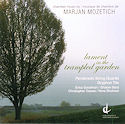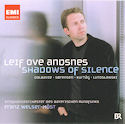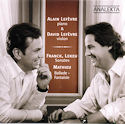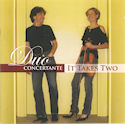 A new Centrediscs release, Lament in the Trampled Garden (CMCCD 14009), presents a beautiful cross section of chamber works spanning two decades. The Penderecki String Quartet is joined by Erica Goodman, Nora Shulman and Shalom Bard (harp, flute and clarinet) for Angels in Flight, a 1987 triptych inspired by an Italian Renaissance Annunciation scene by Fra Filippo Lippi, and by Christopher Dawes (harmonium) for the contemplative Hymn of Ascension (1998). The title track was written as the mandatory piece for the 1992 Banff International String Quartet competition and as such entered the repertoire of 10 outstanding young ensembles, including that year’s grand prize winning St. Lawrence Quartet. In the intervening years Lament has enjoyed countless performances but I believe this is the first commercially available recording. It is a brilliant work that 17 years later is still fresh and exhilarating, especially in the hands of the consummate musicians of the PSQ. The final work dates from just 2 years ago and was commissioned by the Ottawa International Chamber Music Festival for the Gryphon Trio. Scales of Joy and Sorrow is another triptych, with outer movements that respectively build from slow and expressive to fast and exhilarating and vice versa, surrounding a gentle and lilting Arabesque, making an effective A-B-C-B-A arc. The Gryphon Trio is in fine form as always, working together like a well-oiled machine.
A new Centrediscs release, Lament in the Trampled Garden (CMCCD 14009), presents a beautiful cross section of chamber works spanning two decades. The Penderecki String Quartet is joined by Erica Goodman, Nora Shulman and Shalom Bard (harp, flute and clarinet) for Angels in Flight, a 1987 triptych inspired by an Italian Renaissance Annunciation scene by Fra Filippo Lippi, and by Christopher Dawes (harmonium) for the contemplative Hymn of Ascension (1998). The title track was written as the mandatory piece for the 1992 Banff International String Quartet competition and as such entered the repertoire of 10 outstanding young ensembles, including that year’s grand prize winning St. Lawrence Quartet. In the intervening years Lament has enjoyed countless performances but I believe this is the first commercially available recording. It is a brilliant work that 17 years later is still fresh and exhilarating, especially in the hands of the consummate musicians of the PSQ. The final work dates from just 2 years ago and was commissioned by the Ottawa International Chamber Music Festival for the Gryphon Trio. Scales of Joy and Sorrow is another triptych, with outer movements that respectively build from slow and expressive to fast and exhilarating and vice versa, surrounding a gentle and lilting Arabesque, making an effective A-B-C-B-A arc. The Gryphon Trio is in fine form as always, working together like a well-oiled machine.
 While Mozetich’s music is generally painted in pastel shades, that of Marc-André Dalbavie, while still concerned with colour, uses a broader palate. Since first hearing the music of this French “spectral” composer at a Continuum concert in 2005 I have encountered a number of his intriguing works, always with great appreciation. The most recent to come my way is a brilliant Piano Concerto commissioned and performed by Leif Ove Andsnes on a new EMI recording (2 64182 2) with the Bavarian Radio Orchestra under Franz Welser-Möst. While it seems to be central to the thesis of the recording, this disc is not devoted to music of Dalbavie. It also includes the powerful concerto of Witold Lutoslawski, whose music was in many ways a precursor to the spectral pioneers Grisey and Dufourt. While I would not recommend this performance over the 1992 DG recording (431 664-2) with dedicatee Krystian Zimerman as soloist and the composer conducting the BBC Symphony, I welcome this “second opinion” and am happy to be reminded what a striking work it is. These two entrées are book-ended by contemplative works for solo piano by Bent Sorensen and separated by selections from György Kurtág’s playful Játékok (Games). All in all a very well balanced and thoroughly contemporary disc.
While Mozetich’s music is generally painted in pastel shades, that of Marc-André Dalbavie, while still concerned with colour, uses a broader palate. Since first hearing the music of this French “spectral” composer at a Continuum concert in 2005 I have encountered a number of his intriguing works, always with great appreciation. The most recent to come my way is a brilliant Piano Concerto commissioned and performed by Leif Ove Andsnes on a new EMI recording (2 64182 2) with the Bavarian Radio Orchestra under Franz Welser-Möst. While it seems to be central to the thesis of the recording, this disc is not devoted to music of Dalbavie. It also includes the powerful concerto of Witold Lutoslawski, whose music was in many ways a precursor to the spectral pioneers Grisey and Dufourt. While I would not recommend this performance over the 1992 DG recording (431 664-2) with dedicatee Krystian Zimerman as soloist and the composer conducting the BBC Symphony, I welcome this “second opinion” and am happy to be reminded what a striking work it is. These two entrées are book-ended by contemplative works for solo piano by Bent Sorensen and separated by selections from György Kurtág’s playful Játékok (Games). All in all a very well balanced and thoroughly contemporary disc.
Leif Ove Andsnes - Shadows Of Silence![]()
At Grigorian.com
 While quite familiar with the career of Québec pianist Alain Lefèvre, I was not aware of his brother, violinist David Lefèvre, who has spent most of his career in Europe in the first chair at the Orchestre national du Capitole de Toulouse, and later the Orchestre Philharmonique de Monte Carlo, and as Guest concertmaster with the Lisbon Gulbenkian Orchestra. David returned to Montreal last summer, at least long enough to record a CD with brother Alain. The Analekta disc (AN 2 9982) features the familiar (and always welcome) Sonata in A by César Franck, along with a lesser-known G Major Sonata by Franck’s Belgian protégé Guillaume Lekeu (1870-1894) and the Ballade-Fantaisie by André Mathieu. Lekeu lived a tragically short life and composed his sonata at 22, just two years before his death. The work was commissioned by Eugene Ysaÿe and thanks to him it “traveled the world” and was picked up by some of the greatest violinists of the first half of the 20th century. The dramatic, if somewhat melancholy, work has not stayed in the repertoire however and so we come upon it here as something of a hidden treasure. I expect this fine performance will bring some well-deserved attention to the near-forgotten gem. Alain Lefèvre has been instrumental in reconstructing and promoting the works of Québec child prodigy André Mathieu (1929-1968) whose European career was cut short by the outbreak of the Second World War. Written at the age of 13, the same year Mathieu won first prize in the New York Philharmonic’s centenary young composers’ competition, this charming, if somewhat anachronistic, lyric piece is a perfect Canadian companion for the sonatas of these earlier European masters.
While quite familiar with the career of Québec pianist Alain Lefèvre, I was not aware of his brother, violinist David Lefèvre, who has spent most of his career in Europe in the first chair at the Orchestre national du Capitole de Toulouse, and later the Orchestre Philharmonique de Monte Carlo, and as Guest concertmaster with the Lisbon Gulbenkian Orchestra. David returned to Montreal last summer, at least long enough to record a CD with brother Alain. The Analekta disc (AN 2 9982) features the familiar (and always welcome) Sonata in A by César Franck, along with a lesser-known G Major Sonata by Franck’s Belgian protégé Guillaume Lekeu (1870-1894) and the Ballade-Fantaisie by André Mathieu. Lekeu lived a tragically short life and composed his sonata at 22, just two years before his death. The work was commissioned by Eugene Ysaÿe and thanks to him it “traveled the world” and was picked up by some of the greatest violinists of the first half of the 20th century. The dramatic, if somewhat melancholy, work has not stayed in the repertoire however and so we come upon it here as something of a hidden treasure. I expect this fine performance will bring some well-deserved attention to the near-forgotten gem. Alain Lefèvre has been instrumental in reconstructing and promoting the works of Québec child prodigy André Mathieu (1929-1968) whose European career was cut short by the outbreak of the Second World War. Written at the age of 13, the same year Mathieu won first prize in the New York Philharmonic’s centenary young composers’ competition, this charming, if somewhat anachronistic, lyric piece is a perfect Canadian companion for the sonatas of these earlier European masters.
Alain & David Lefevre: Violin Sonatas Of Franck, L![]()
At Grigorian.com
 The final disc this month is also one of violin and piano duos, but this time more eclectic and somewhat lighter fare. Violinist Nancy Dahn and pianist Timothy Steeves, hail from Newfoundland where they are professors at Memorial University. They have shown a strong commitment to Canadian composers during the twelve years they have been playing together as Duo Concertante and a previous CD included works written for them by Chan Ka Nin, Kelly-Marie Murphy and Omar Daniel. In June they will record their fifth CD at Glenn Gould Studio, another all-Canadian disc, featuring a work by R. Murray Schafer which they premiered last year. Their current offering, It Takes Two (Marquis Classics 81401), is meant as more of a crowd pleaser, an album of encore-type pieces. With repertoire ranging from a medley of Gershwin tunes through Dizzy Gillespie’s A Night in Tunisia and de Abreu’s Tico Tico to classical show-stoppers like Rondo alla Turka and Sabre Dance and more melancholy fare such as Solveig’s Song and Valse triste, there is literally something for everybody. While thoroughly international in scope, even this project has a strong Canadian component. All the works were arranged for Duo Concertante by Clifford Crawley, a British-born Canadian who is Professor Emeritus at Queen’s University and now makes his home in St. John’s. In the words of the Duo, the title of this disc might more accurately be “It Takes Three”.
The final disc this month is also one of violin and piano duos, but this time more eclectic and somewhat lighter fare. Violinist Nancy Dahn and pianist Timothy Steeves, hail from Newfoundland where they are professors at Memorial University. They have shown a strong commitment to Canadian composers during the twelve years they have been playing together as Duo Concertante and a previous CD included works written for them by Chan Ka Nin, Kelly-Marie Murphy and Omar Daniel. In June they will record their fifth CD at Glenn Gould Studio, another all-Canadian disc, featuring a work by R. Murray Schafer which they premiered last year. Their current offering, It Takes Two (Marquis Classics 81401), is meant as more of a crowd pleaser, an album of encore-type pieces. With repertoire ranging from a medley of Gershwin tunes through Dizzy Gillespie’s A Night in Tunisia and de Abreu’s Tico Tico to classical show-stoppers like Rondo alla Turka and Sabre Dance and more melancholy fare such as Solveig’s Song and Valse triste, there is literally something for everybody. While thoroughly international in scope, even this project has a strong Canadian component. All the works were arranged for Duo Concertante by Clifford Crawley, a British-born Canadian who is Professor Emeritus at Queen’s University and now makes his home in St. John’s. In the words of the Duo, the title of this disc might more accurately be “It Takes Three”.
Duo Concertante: It Takes Two![]()
At Grigorian.com
Concert Note: Duo Concertante will perform a free noon-hour concert in the Richard Bradshaw Amphitheatre at the Four Seasons Centre on May 5.
We welcome your feedback and invite submissions. CDs and comments should be sent to: The WholeNote, 503 – 720 Bathurst St. Toronto ON M5S 2R4. We also encourage you to visit our website, www.thewholenote.com, where you can find added features including direct links to performers, composers and record labels and “buy buttons” for on-line shopping.
David Olds
DISCoveries Editor
discoveries@thewholenote.com



